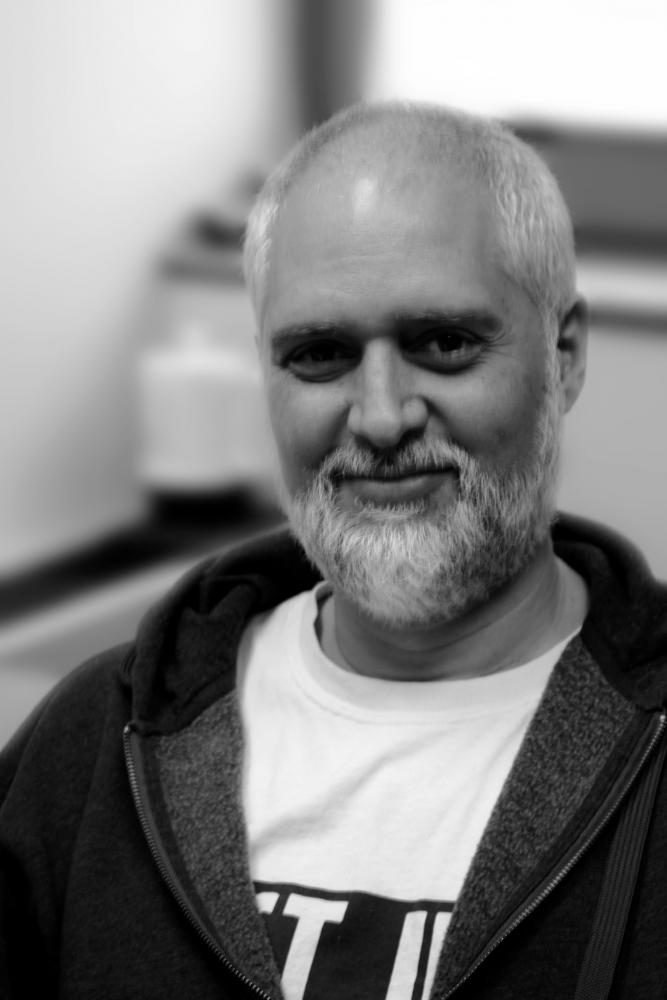Professor Profile: Marcos Bisticas-Cocoves
AWOL’s Seth Shamon sat down with Marcos to talk politics, life, and of course, philosophy.
At what point did you decide that you wanted to study philosophy?
I was an undergraduate at Antioch [College], and I was a student activist. I found that a lot of the people I was organizing with in my activism had a very low level of analysis — as it was put, they were ‘good people against all bad things.’ And I thought that there might be more to it than that, that we might be able to have a richer analysis, ultimately in the service of my activism — our activism. But I also found it not simply useful as a means, but enjoyable as an ends in itself.
Are there specific experiences you’ve had that have shaped your political beliefs, or revelations that have led to a change in lifestyle?
It’s hard to isolate a single moment, but there have been certain experiences that have been defining for my life and for much of my generation. I’m a gay man who came out in the early ‘80s — and I think I even may have talked about this in class last semester — and of the guys I went to college with that I came out with, most of them are [HIV] positive, sick, or dead. When you see your community attacked like that — decimated like that — it’s an imperative to action. And so at some point I became active in Act Up [the New York-based Aids Awareness Group] and got arrested, and did that whole thing.
What do you see, if anything, in activism at AU?
Well, I’m here one day a week — one afternoon — so I don’t see an awful lot. You know, sometimes I see tables, or you come to me or Bobby [Allyn] comes to me, right, but, you know, I don’t have my pulse on the AU community.
Do you feel like there is now more of a tabling and lobbying approach to activism than an active approach? Would you say that the word ‘active’ seems to have a different connotation nowadays?
It’s my experience that movements that are engaged in direct action come in waves. So, for instance, in the early ‘90s I was part of Act Up. And there was a big wave of activity in action up from say ‘90 to ‘95. And starting in ‘99, with Seattle, you know, there was this whole wave of activism around that. And that petered out. And nothing has quite taken its place yet. And I suspect something will at some point.
So is activism always simply a result of external circumstances? Is our condition now simply such that it does not call people to action directly?
It can’t be simply a response to external circumstances, although there is something reactive about our politics sometimes. Because it’s not like there isn’t stuff happening now, that there’s not more of an activist response to the war, or to the healthcare system, or to the crisis of capitalism. My family lives in Greece, and right now Greece is in economic chaos, but the Greeks will stage a general strike at the tip of a hat. So again, part of it I think is a singularly American reaction to some of these crises.
Do you generally find it hard to reconcile idealism and politics? Do you consider yourself an idealist?
I have a troubled relation with the word idealist, as I have a troubled relation with the word utopian. I think that critique is ultimately impossible without hope for something better. But idealism can sometimes have the ring of a lack of realism. The world which I want to build is not just a mere ideal or an unreachable ideal, but is a concrete goal.
What do you think of the motto “think globally, act locally”?
Well, I think that it’s good as far as it goes, but I think it’s clearly not a complete philosophy, is it? It’s a nice slogan, and it needs to be supplemented by other ideas. I mean, I’m sure a fascist could say ‘think globally, act locally’, and clearly certain economic systems today are thinking globally and acting locally.
What do you like best about teaching?
What I like best about teaching is, well, when I have trained students enough so that they can go into the text alone. All I can do is point in the direction and stand back and watch them at work.







